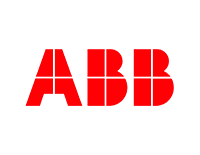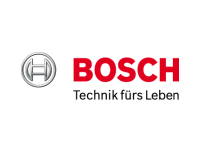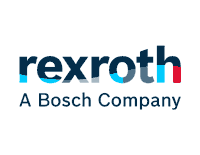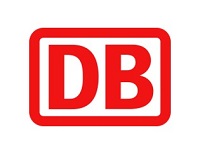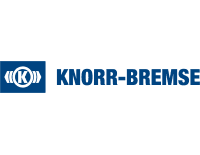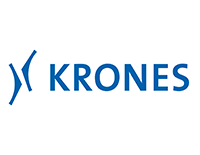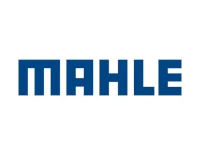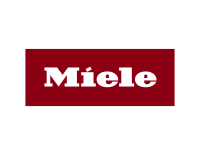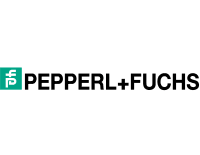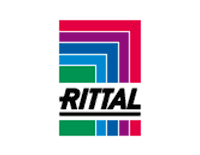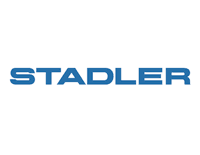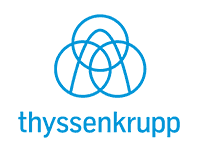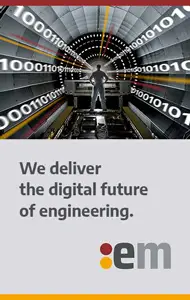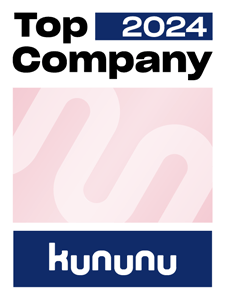What is Product Lifecycle Management (PLM)?
Product Lifecycle Management – PLM for short – is the backbone of a company’s digitalization strategy and thus enables the vision of a digital twin across all domains in the company. PLM is not just an IT application, but much more:
“PLM is a strategic business approach that uses a consistent set of enterprise solutions to support the collaborative creation, management, dissemination and use of product definition information across the enterprise from conception to end-of-life, integrating people, processes, business systems and information.” (CIMdata 2002 )
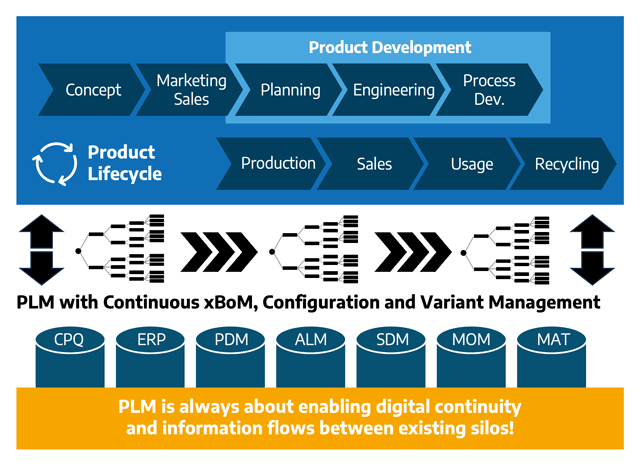
What added value do our consulting services in Product Lifecycle Management offer you?
Future-oriented product lifecycle management strategy as the basis of the digital twin
Ensuring end-to-end cross-disciplinary data and configuration management
Improving efficiency in interdisciplinary development (ALM/PLM) and shortening time-to-market
Product Lifecycle Management – our consulting services
We bring consistency to the life cycle of your products!
We help you to meet the requirements of your company, such as Systems Engineering or Model Based Engineering, and to design a continuous flow of information through the departments of your company – from the first requirement up to product recycling.
We optimize your IT landscape
Is your current engineering IT environment – including your PDM system – reaching its limits? Together with you we analyze how to design your company’s PLM IT landscape with a view to future challenges posed by the digitalization of processes.
We create technical concepts for PLM methods
Methodical preparation and documentation of topics, such as cross-discipline configuration management, variant and change management, in order to meet the current challenges of digitalization through individualization of products or interdisciplinary development – This enables your development engineers to save valuable time in the search for context-relevant data and duplicate developments are avoided.
We support you in the targeted handling and use of field data
We will show you how to efficiently include information about the configurations of your smart products and their live data generated by IoT technologies into the digital twin in the product development process, in order to improve, for example, the requirements towards the products.

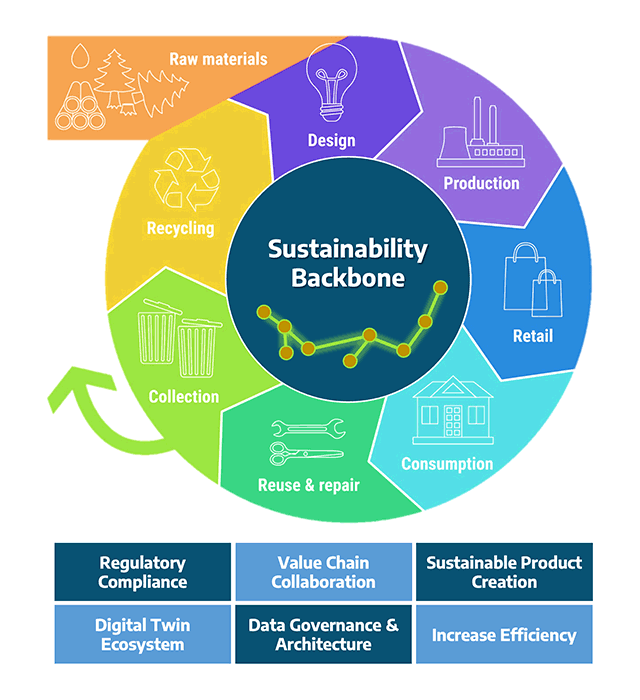
Engineering for Sustainability
Engineering for Sustainability is an interdisciplinary approach to the development, design and implementation of technologies, infrastructures and systems that are environmentally sustainable and economically viable, responding to wide-ranging external changes and trends such as climate change, resource scarcity or the circular economy. The focus is on reducing pollution, making optimal use of natural resources and creating social justice by developing technologies that are sustainable in the long term.
In order to be able to successfully contribute to the implementation of company-wide sustainability goals on the basis of the company’s own engineering, a profound understanding of its own products, their components and the corresponding development processes is necessary. In addition, a continuous traceability of material and component information along the own product life cycle is necessary, which requires a continuous engineering IT landscape.
We develop a sustainability roadmap for your engineering. This requires the development of an overarching vision, the identification of potential benefits in terms of contributions to the company’s sustainability goals and the definition of fields of action. We use our proven MBITA methodology for this modular and scalable range of services.
Linking Product Lifecycle Management (PLM) with Application Lifecycle Management (ALM)
The proportion of software in innovative mechatronic or even cyber-physical products is constantly increasing and as a result the complexity of the interdisciplinary challenges in product development is growing. At the same time, a frequently unresolved issue in data management is increasingly coming into focus: the non- or insufficient integration of Application Lifecycle Management systems (ALM systems) for software development with the Product Lifecycle Management systems (PLM systems) of “classic” product development.
We develop your individual PLM/ALM roadmap with our proven process model, evaluate the maturity level and define the necessary interdisciplinary technical data model for successful integration. Regardless of which systems you use, we ensure successful system integration and support you in the specification and development of necessary interfaces.
Read more about this in our publication in ProduktDaten Journal in german language.
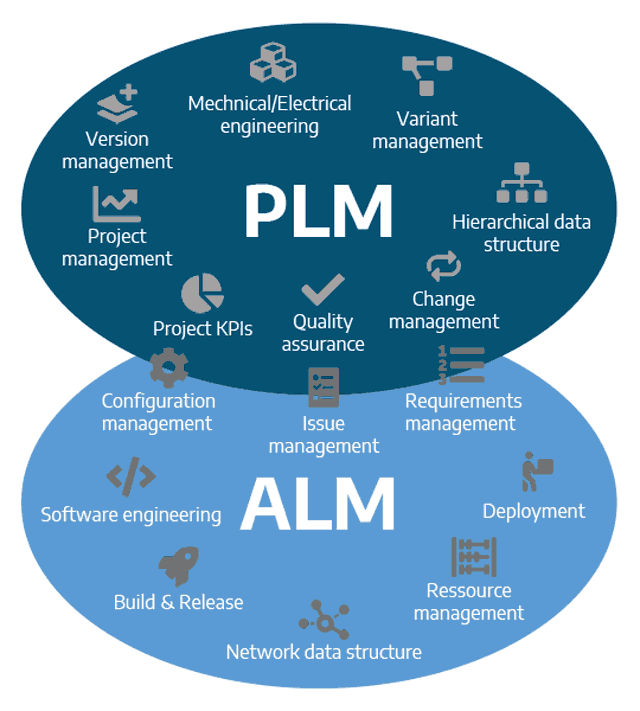
Find more information about our Product Lifecycle Management services in the PDF flyer
Please download our information brochure on PLM by clicking the button.
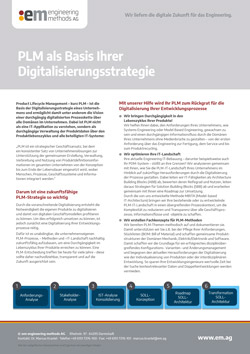
FAQ – frequently asked questions about Product Lifecycle Management
The advancing digitalization creates the need to digitalize your own products and thus to be able to benefit from digital business models. In order to implement this successfully it is first necessary to digitise your development processes. For this, it is indispensable to build up the company’s own PLM processes, methods and IT landscape in a sustainable manner in order to be able to achieve consistency in the life cycle of your products. You make a PLM decision today for the next decades – it should therefore be comprehensible, transparent and oriented towards the future.
At :em AG, we understand a digital twin to mean the following:
A digital twin is a dynamic and cross-domain virtual image of a physical system that is connected to it for bidirectional data exchange. The digital twin is created through the targeted, seamless and continuous networking of information from different phases of the life cycle of an instance of a product service system.
A long-term, future-proof PLM strategy is a basic prerequisite for the successful implementation of the digital twin. For example, a targeted feedback of field data into product development is not possible without a continuous flow of information throughout the entire product life cycle.
In many companies, ALM and PLM systems are not connected. As a result, collaboration between mechanical/mechatronic, hardware and software development is often uncoordinated and inefficient with a high level of manual effort. As a result, product quality and time-to-market suffer. For example, changes to overall product requirements can lead to contradictory changes in the domains if the change processes are initiated and controlled independently of each other. The consequences are changes in the late phase of product development, e.g. during commissioning, which cause high costs and could have been avoided with early coordination. In addition, inconsistencies in compatibilities between software and hardware status can arise due to missing integrations and it becomes difficult to determine which software version is compatible with which hardware component. Efficient ALM/PLM integration is achieved by connecting the right information objects within the tools, taking into account the existing tool landscape as well as the existing processes and roles.




